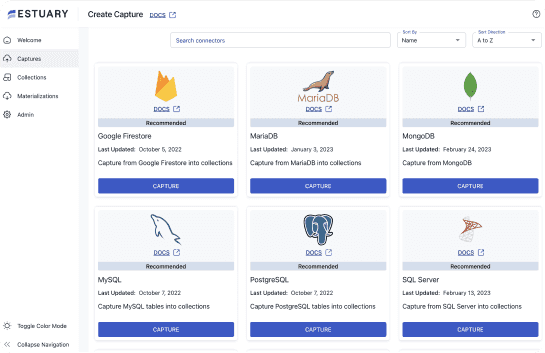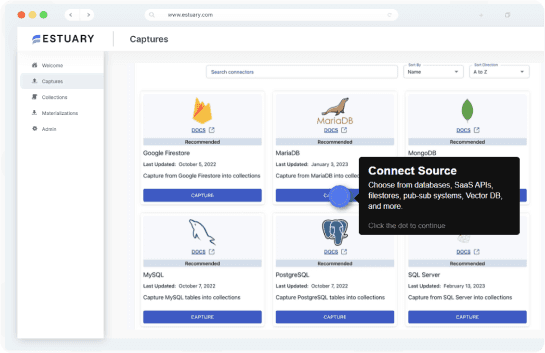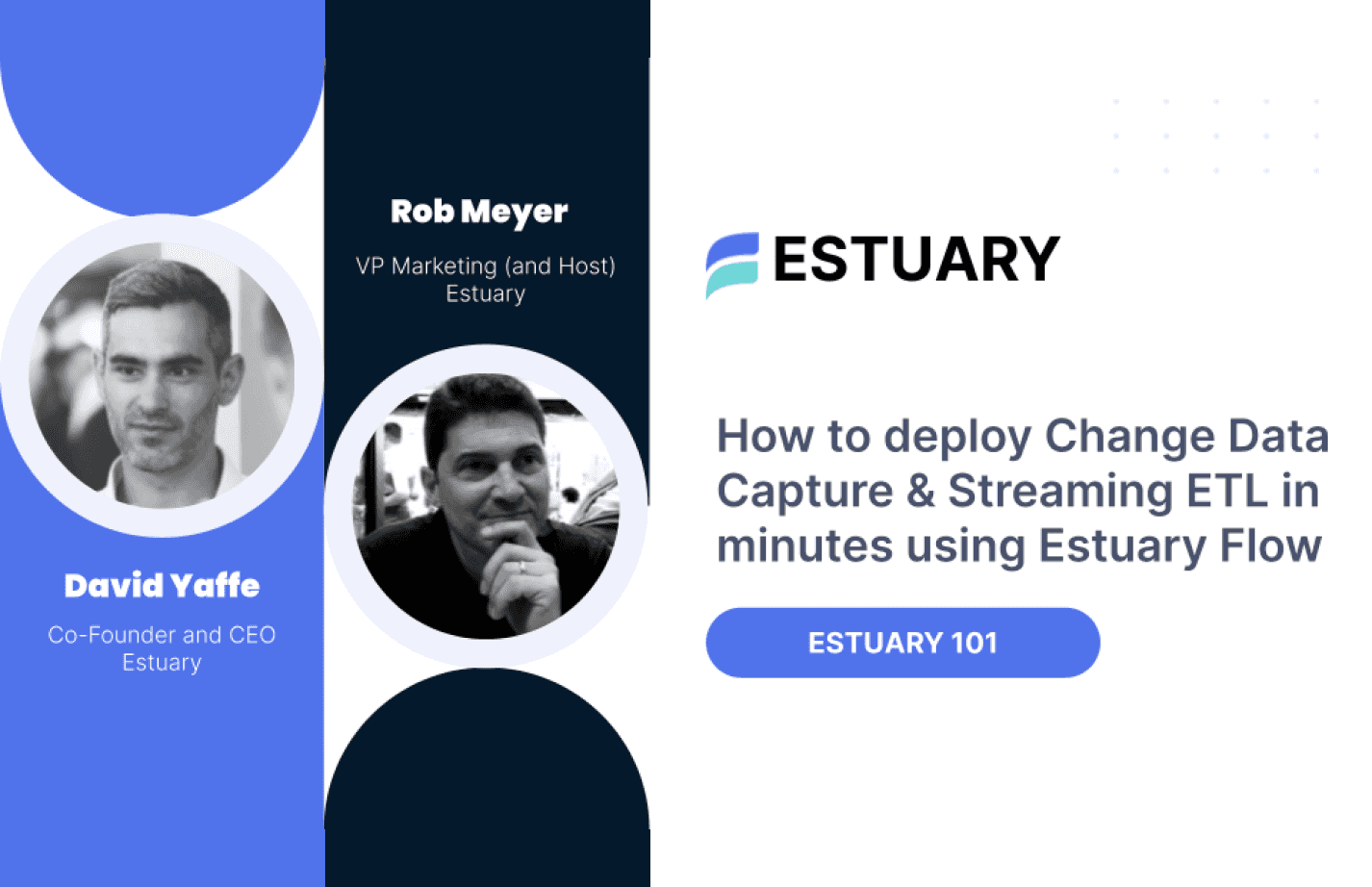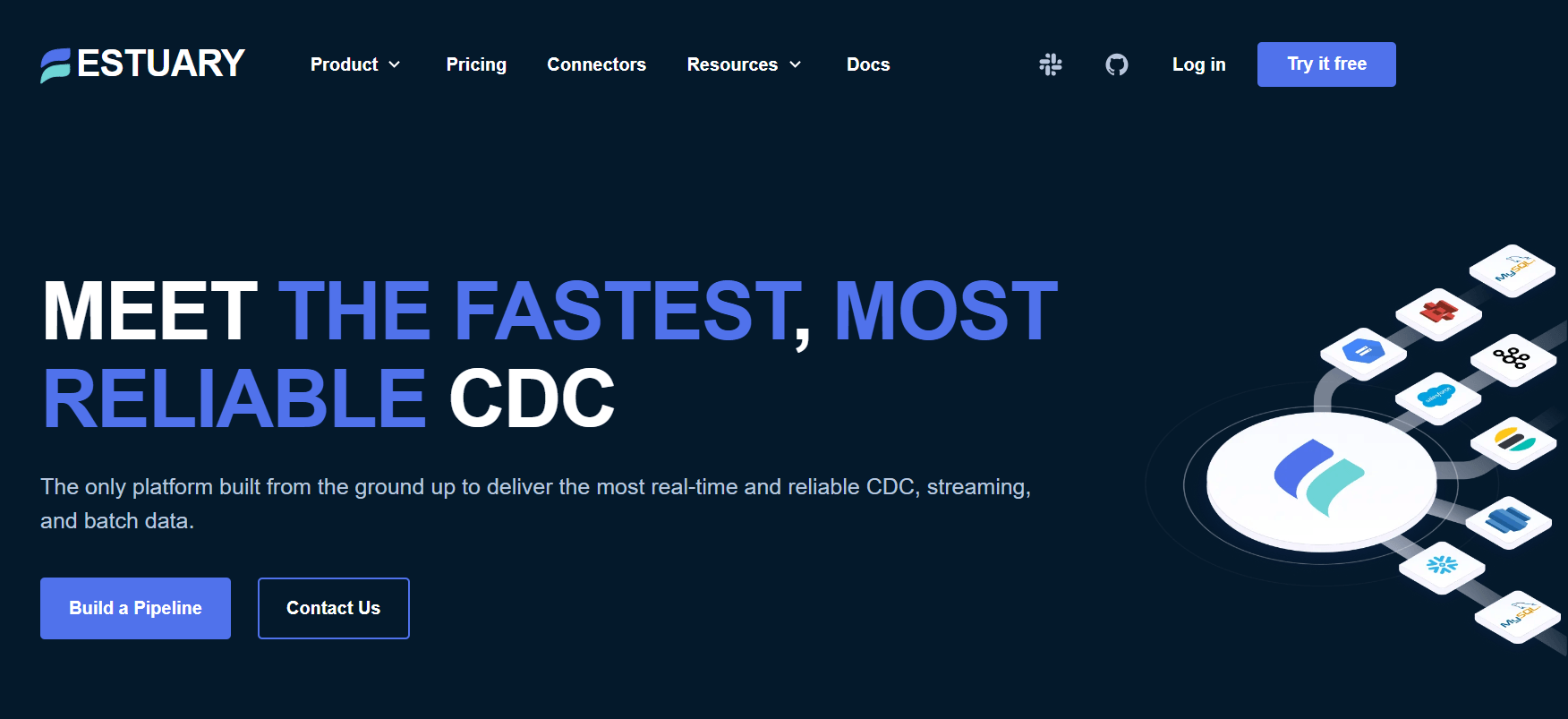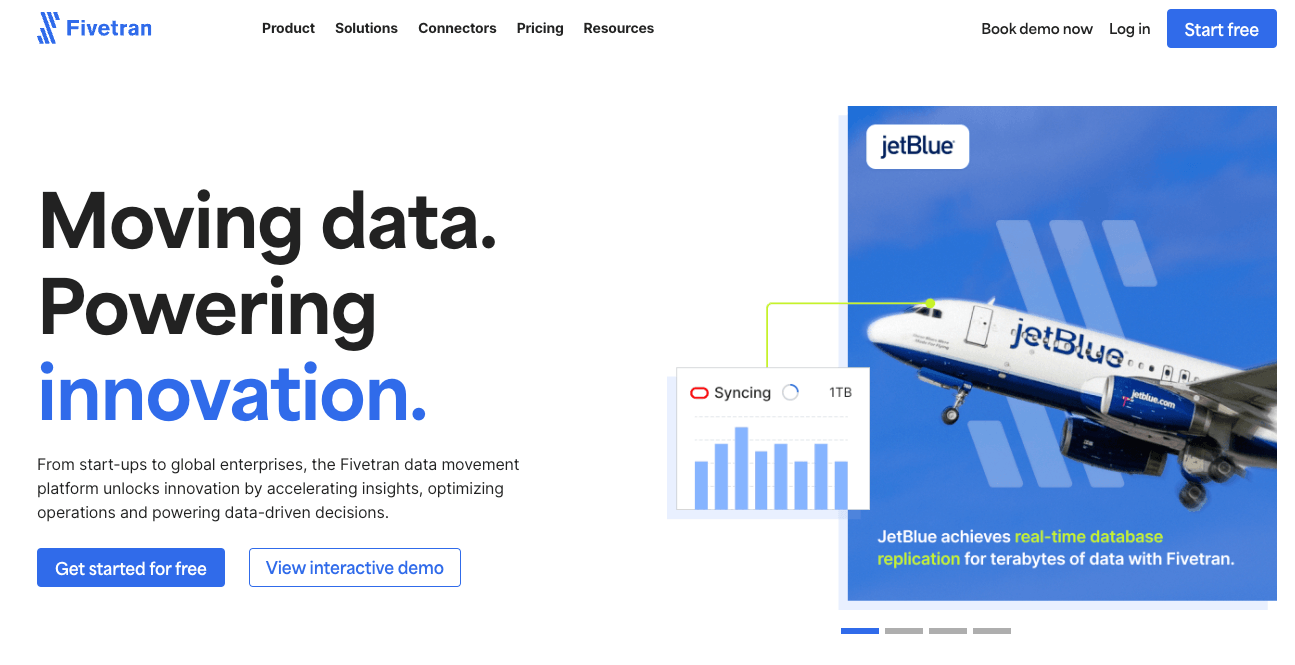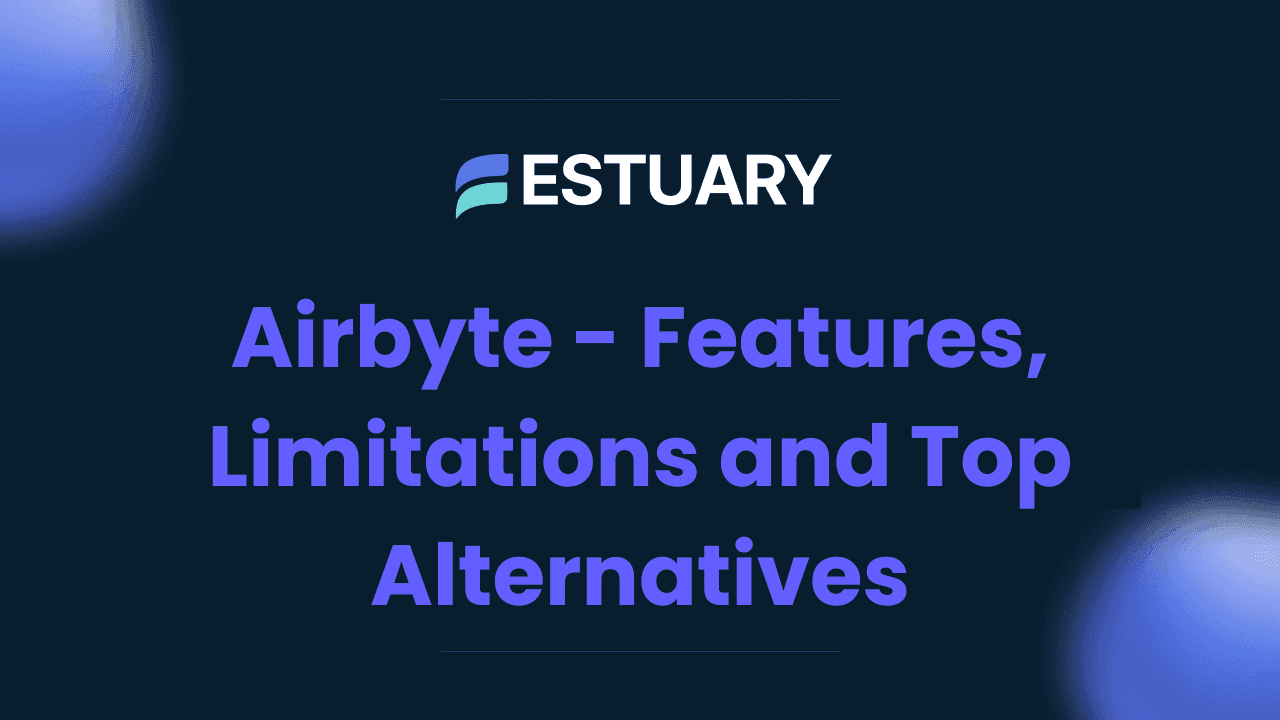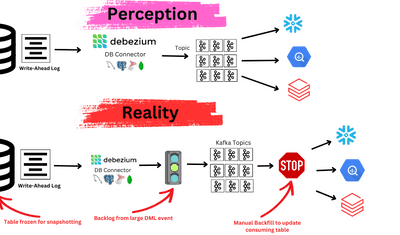
Choosing the right data integration tool is no longer just about moving data from point A to point B. As data volumes grow and use cases expand beyond analytics into operational systems, teams evaluating Airbyte often start looking for alternatives that offer different tradeoffs around latency, reliability, deployment model, and cost predictability.
If you’re exploring Airbyte alternatives, several strong options stand out in 2026, including Estuary, Meltano, Fivetran, Matillion, Stitch, Workato, and Rivery. These tools vary widely in architecture, ranging from open-source, self-hosted frameworks to fully managed SaaS platforms, and from batch-only ELT pipelines to event-driven and streaming-based approaches.
This guide provides a practical, side-by-side comparison of the leading Airbyte competitors, covering both open-source and commercial options. We’ll break down how each tool handles data movement, transformations, scalability, pricing, and operational overhead so you can identify the Airbyte alternative that best fits your technical requirements and long-term data strategy.
Key Takeaways
- Airbyte is a popular open-source ELT tool, but its batch-oriented architecture may not suit teams with low-latency or real-time requirements.
- Open-source alternatives like Meltano appeal to engineering-led teams that prefer pipelines-as-code and are comfortable managing infrastructure.
- Fully managed platforms such as Fivetran and Matillion reduce operational overhead but typically rely on scheduled batch updates.
- Some alternatives, including Estuary, support a wider range of ingestion patterns, from sub-second CDC to scheduled batch pipelines.
- The best Airbyte alternative depends on connector reliability, latency needs, operational complexity, and long-term cost predictability.
How This Comparison Was Evaluated
This guide is written from a practitioner’s perspective, based on how data integration tools behave in real production environments, not just how they appear in feature lists or marketing pages.
Each Airbyte alternative in this comparison was evaluated using the same criteria data teams typically use when operating pipelines at scale:
Connector reliability and maintenance
We assessed whether connectors are vendor-maintained or community-maintained, how often they break during source or API changes, and how much operational effort is required to keep pipelines running reliably over time.
Latency and data freshness
Tools were compared based on how frequently data can move, ranging from scheduled batch syncs to near real-time and sub-second change data capture. This matters for use cases such as operational analytics, real-time dashboards, and reverse ETL.
Scalability and operational overhead
We considered how platforms handle large historical backfills, ongoing incremental updates, and schema changes, as well as whether teams must manage infrastructure, scaling, retries, and monitoring themselves.
Transformation and orchestration approach
We evaluated whether transformations are built in, handled through dbt or external tools, or supported natively through streaming-first architectures, and how that impacts complexity and reliability.
Cost predictability at scale
Pricing models were reviewed with an emphasis on how costs behave as data volume grows, including the impact of re-syncs, backfills, and high-frequency updates.
Deployment and support models
Platforms were compared across self-hosted, managed SaaS, and private deployment options, along with the availability of enterprise support, SLAs, and long-term vendor stability.
The goal of this comparison is not to declare a single “best” tool for every team, but to clearly outline the tradeoffs so you can choose the Airbyte alternative that fits your latency requirements, engineering capacity, and cost constraints.
What is Airbyte?
Airbyte is an open-source ELT data integration tool that also offers a managed, no-code SaaS platform. Since its launch in 2020, it has become one of the most popular tools in the modern data stack for connecting data sources and destinations.
Like most ELT platforms, Airbyte uses connectors to extract data from multiple systems and load it into data warehouses or lakes. What makes Airbyte stand out is its community-driven model that encourages developers and users to contribute new connectors, resulting in one of the largest open-source connector ecosystems in the industry.
Key Features of Airbyte
- Open Source and SaaS Options: Choose between self-hosted and managed ELT versions.
- Transformation Capabilities: Integrates with dbt to design and manage post-load transformations.
- Extensive Connector Library: Offers broad support for databases, APIs, and SaaS platforms.
- Community Contributions: Actively maintained by a growing developer community that builds and improves connectors.
Airbyte’s flexibility and large connector library make it a popular starting point for many data teams. However, because it focuses mainly on batch-based ELT and depends on external transformation tools like dbt, it may not always meet real-time or streaming requirements.
Why Would Businesses Need an Airbyte Alternative?
While Airbyte is a capable and flexible tool, many organizations eventually look for alternatives because of performance, reliability, or cost considerations. Depending on your team’s priorities, you may need a platform that offers more predictable performance, stronger real-time capabilities, or enterprise-grade support.
Common reasons businesses seek an Airbyte alternative include:
- Inconsistent connector quality: Because Airbyte relies on community-built connectors, performance and maintenance standards vary widely. Some connectors are robust, while others may break during updates or fail under heavy workloads.
- Frequent updates and breaking changes: Airbyte’s rapid release cycle means connectors and configurations often change, forcing teams to adapt or re-test pipelines regularly.
- Limited transformation capabilities: Airbyte focuses mainly on extraction and loading. For transformations, it depends on external tools such as dbt, which adds operational complexity.
- Latency limitations: Airbyte’s architecture is batch-oriented, with sync intervals typically measured in minutes or hours, making it unsuitable for real-time data movement.
- Infrastructure overhead for open source users: Teams using the self-hosted version must handle infrastructure, scaling, and monitoring themselves, increasing operational costs and complexity.
For organizations that require real-time or right-time data pipelines, need to reduce operational overhead, or want predictable costs at scale, exploring alternatives like Estuary, Meltano, or Fivetran can be a better long-term strategy.
Understanding Airbyte Pricing
Airbyte offers both free, self-hosted open-source software and paid managed cloud plans. Airbyte Core is always free but requires teams to manage infrastructure, scaling, and maintenance themselves. Airbyte Cloud uses a mix of volume-based pricing on lower tiers (charging for data moved from databases or APIs) and capacity-based pricing on higher tiers, where costs scale with allocated compute (“Data Workers”). While this flexibility supports different deployment needs, pricing can become harder to predict as data volume, sync frequency, or parallel workloads increase, particularly for large backfills or frequent incremental updates.
Airbyte Alternatives Compared: Features and Pricing
| Tool | Real-Time or Right-Time Support | Open Source | Deployment Options | Transformations | Pricing Model |
|---|---|---|---|---|---|
| Estuary | Right-time (sub-second to batch) | Partial (open-core components) | Managed SaaS, Private Cloud | dbt and streaming-native | Usage-based pricing designed for predictable TCO |
| Airbyte | Batch (minutes+) | Yes | Managed SaaS, Self-hosted | dbt | Free open source core; Cloud plans use volume-based pricing on lower tiers and capacity-based pricing (Data Workers) on higher tiers |
| Fivetran | Batch only | No | Managed SaaS, Limited Private Deployment | dbt Core | Monthly Active Rows (MAR) pricing |
| Meltano | Batch only | Yes | Self-hosted | dbt, CLI-based workflows | Free (open source); infrastructure costs managed by user |
| Matillion | Batch only | No | Self-hosted (cloud VM) | Built-in transformations | License-based pricing |
| Stitch | Batch only | No | Managed SaaS | Minimal transformations | Free tier; usage-based per-row pricing |
| Workato | Event-driven automation (operational focus) | No | Managed SaaS | No-code workflows | Enterprise pricing |
| Rivery | Batch only | No | Managed SaaS | Built-in transformations | Tiered usage-based pricing |
While this table highlights high-level differences, the right Airbyte alternative depends on how each platform handles latency, operational overhead, and long-term cost at scale.
Top Airbyte Alternatives in 2026
The following tools are commonly considered Airbyte alternatives because they offer different tradeoffs across latency, deployment model, operational overhead, and cost predictability. Some focus on open-source, self-hosted workflows, while others prioritize fully managed batch or real-time data movement.
Below, we take a closer look at each option, including their strengths, limitations, and the types of teams they are best suited for.
Estuary
Estuary is positioned as a right-time data platform, designed to support CDC, streaming, and batch workloads within a single system. Rather than enforcing a single ingestion pattern, it allows teams to choose when data moves based on use-case requirements, ranging from sub-second updates to scheduled batch pipelines.
Architecturally, Estuary is built around continuous data movement instead of periodic sync jobs. This reduces batch-related latency and avoids many of the operational issues commonly associated with incremental polling-based ingestion, particularly as data volume and update frequency increase.
For teams comparing Airbyte alternatives, this architectural difference becomes important when managing large backfills, frequent updates, or operational workloads that require fresher data. Streaming-first ingestion can reduce connector maintenance burden, minimize repeated re-syncs, and lower self-hosting overhead compared to batch-oriented ELT pipelines.
Architecture and Operational Considerations
Estuary uses change data capture for supported sources, processing updates as they occur rather than on fixed schedules. This reduces batch-related latency and simplifies schema evolution handling by validating changes continuously instead of relying on frequent full refreshes.
Because ingestion is event-driven rather than job-based, Estuary can provide exactly-once delivery guarantees for many workloads. The difference between incremental vs streaming ingestion becomes more important for teams supporting real-time dashboards, operational analytics, or reverse ETL use cases.
Key Features
- Right-time data movement: Move data sub-second, near real time, or in batch based on workload needs.
- Change Data Capture (CDC): Capture record-level changes instantly with minimal impact on source systems.
- Unified data movement: Combine CDC, streaming, and batch pipelines within one platform.
- Flexible deployment: Available as SaaS or private cloud for maximum control and compliance.
- Broad connector ecosystem: Supports 200+ native connectors and compatibility with hundreds more from open ecosystems.
- Transformations your way: Choose between dbt and streaming-native transformations for flexible processing.
- Predictable pricing: Transparent usage-based model that helps maintain predictable TCO.
Pros
- Unified platform for CDC, streaming, and batch data pipelines.
- Sub-second latency for real-time data movement.
- Predictable TCO with transparent usage-based pricing.
- Multiple deployment options for security and compliance.
- High scalability and reliability with exactly-once delivery guarantees.
Cons
- May require basic technical understanding to optimize real-time streaming pipelines.
Learn more in our detailed comparison: Estuary vs Airbyte
Meltano
Meltano is an open-source data integration platform built for data engineers who prefer a code-first approach. Designed around pipelines-as-code, it provides strong CLI support, version control, and CI/CD integration, making it ideal for teams that follow software development best practices. Meltano leverages Singer taps for data extraction, offering one of the largest connector ecosystems, and integrates seamlessly with dbt for transformation and Apache Airflow for orchestration.
Key Features
- CLI-Driven Workflow – Built for command-line execution, enabling automation and scripting.
- Wide Connector Support – Uses Singer taps, providing access to numerous data sources.
- Version Control & CI/CD Integration – Ensures repeatable, well-managed data pipelines.
- dbt & Apache Airflow Compatibility – Supports modular transformation and orchestration.
- Flexible & Extensible – Open-source nature allows teams to customize and extend functionality.
Pros
- Robust CLI & Version Control Support – Built for developers who follow programming best practices, offering better control over data workflows.
- Extensive Connector Support – Thanks to Singer taps, Meltano offers more connectors than most data integration platforms.
- Customizable & Flexible – Since it's open-source, teams can modify and extend the platform based on their specific needs.
Cons
- Steep Learning Curve – Lacks a user-friendly UI, making it less accessible for non-technical users.
- Requires Developer Expertise – Best suited for data engineers comfortable with coding, CLI operations, and version control.
Want a deeper dive? Read our full comparison of Airbyte vs Meltano.
Matillion
Matillion is a self-hosted ETL platform designed for organizations that prioritize data privacy, security, and control over their infrastructure. Unlike many CLI-based open-source alternatives, Matillion provides a user-friendly UI for building and managing data pipelines, making it accessible to a broader range of users. It offers dedicated customer support, which is a key differentiator from most open-source competitors. However, while its UI-driven transformation capabilities are robust, it does not integrate with external transformation tools like dbt.
Key Features
- Self-Hosted Deployment – Runs on your own infrastructure, ensuring full data control.
- Intuitive UI for ETL – Designed with a visual, drag-and-drop interface for pipeline management.
- Built-In Transformation Engine – Processes transformations without requiring third-party tools like dbt.
- Dedicated Customer Support – Offers professional assistance for deployment and troubleshooting.
- Enterprise-Focused Security – Suitable for industries with strict data governance requirements.
Pros
- User-Friendly Interface – No need for extensive CLI knowledge; enables a visual approach to ETL.
- Full Product Support – Includes dedicated customer service, unlike most open-source competitors.
- Secure & Private – Ideal for organizations that require on-premise or cloud-hosted control over their data.
Cons
- Vendor Lock-In – Not as flexible as open-source options, requiring commitment to Matillion’s ecosystem.
- UI Learning Curve – While user-friendly, the interface has a learning curve for new users.
- Limited Connector Availability – Fewer built-in connectors compared to Airbyte and Meltano.
Curious how these two stack up? See Airbyte vs Matillion for the full feature-by-feature breakdown.
Fivetran
Founded in 2012, Fivetran is a pioneering cloud-based data integration platform, trusted by thousands of customers globally. It offers a low-code environment with an extensive array of proprietary connectors, simplifying the process of centralizing data from various sources into data warehouses. Unlike some competitors, Fivetran is a fully closed-source platform, with all connectors developed in-house. While it has been a dominant force in the industry, recent advancements in other data integration solutions have introduced fresh competition, providing users with more alternatives.
Key Features
- Extensive Connector Library – Supports a wide range of proprietary connectors for seamless data integration.
- Automated Data Synchronization – Continuously updates and syncs data without manual intervention.
- User-Friendly Interface – Provides an intuitive UI for easy setup and management of data pipelines.
- Fully Managed Service – Eliminates maintenance burden with automatic updates and infrastructure handling.
- Enterprise-Grade Security – Complies with SOC 2, GDPR, and HIPAA security standards.
Pros
- Large number of connectors – Extensive proprietary connector support makes integration easier.
- Established platform – Trusted by thousands of businesses with comprehensive documentation available.
- Easy-to-use UI – Designed for users of all technical levels, requiring minimal setup.
- Automated pipeline management – Data syncs run automatically, reducing manual workload.
- Strong security compliance – Adheres to industry security and privacy standards.
Cons
- No pre-load transformation capabilities – Lacks built-in transformation tools, requiring external solutions.
- No extensibility – Closed-source with no flexibility for custom connectors.
- Opaque pricing – Users report unexpected charges and lack of clear cost breakdowns.
- Expensive for large data volumes – Monthly Active Rows (MAR) pricing can lead to high costs as data scales.
- Slow customer support – Users have experienced delays in getting support responses.
Need more detail? Here’s our side-by-side comparison: Airbyte vs Fivetran
We’ve also compared Fivetran vs Matillion for teams weighing enterprise ETL platforms.
Stitch Data
Stitch Data, a cloud-based ETL platform owned by Talend, offers a simple, no-code solution for transferring data to warehouses. With over 130 pre-built connectors and a self-service model, it caters to businesses looking for a budget-friendly and easy-to-use Airbyte alternative. Smaller teams benefit from its free tier (up to 5 million rows per month), while larger organizations can scale with its paid plans. However, Stitch has limited transformation capabilities, requiring additional tools for complex data processing.
Key Features
- 130+ Connectors – Supports a wide range of integrations with various data sources.
- No-Code Setup – Designed for ease of use, making data ingestion simple for all users.
- Free Tier Available – Offers up to 5 million rows per month at no cost.
- Singer-Based Extensibility – Supports open-source connectors via the Singer framework.
- Built-In Orchestration & Monitoring – Provides basic visibility into data pipeline execution.
Pros
- Extensible through Singer – Integrates with open-source connectors, allowing for additional flexibility.
- Orchestration & visibility features included – Helps monitor data pipeline execution.
- Integrates with Talend Data Fabric – Works seamlessly with other Talend products.
- No-code, self-service model – Quick to set up with minimal technical expertise required.
- Free tier for small workloads – Ideal for startups and small teams with low data volumes.
Cons
- Pricing scales with row usage – Beyond the free tier, pricing is based on monthly rows, which can become costly.
- Limited transformation support – Minimal built-in transformation capabilities, requiring external tools like dbt.
- Not ideal for complex ETL needs – Lacks advanced data processing features compared to some competitors.
See a direct comparison in our full guide: Airbyte vs Stitch.
Workato
Workato is an integration platform as a service (iPaaS) that goes beyond traditional ETL/ELT tools by enabling real-time automation across entire business workflows. Unlike Airbyte, which primarily focuses on data movement, Workato facilitates full-system integrations, allowing organizations to automate tasks across multiple platforms. This makes it a strong choice for businesses looking for a holistic automation solution rather than just a data pipeline tool.
Key Features
- Real-Time Integration – Enables instant data synchronization for operational analytics and workflow automation.
- Broad Connector Library – Supports hundreds of business applications, including CRM, ERP, and SaaS tools.
- Workflow Automation – Automates cross-platform processes, reducing manual intervention.
- Enterprise Security & Compliance – Provides robust governance features for data security.
- Scalability – Designed to handle enterprise-wide system integrations efficiently.
Pros
- Real-time data processing – Suitable for small-scale operational analytics and workflow automation.
- Extensive connectors – Supports a large number of applications for seamless integration.
- End-to-end automation – Goes beyond ETL to automate entire business processes.
- No-code/low-code – User-friendly interface for quick implementation.
- Secure and enterprise-ready – Compliance with industry standards for data security.
Cons
- Expensive for some businesses – Pricing can be high for organizations with extensive automation needs.
- Not ideal for large-scale data movement – Better suited for workflow automation rather than bulk ETL.
- Steep learning curve – While no-code, configuring complex workflows requires expertise.
Rivery
Rivery is a fully managed, cloud-native data integration platform that offers ETL, ELT, and reverse ETL capabilities within a single product. Unlike Airbyte and other open-source tools that require external transformation tools like dbt, Rivery includes built-in orchestration, transformations, and logic layers for a complete data workflow solution. It’s designed to serve teams looking for ease of use, fast setup, and enterprise-grade support without dealing with infrastructure or code.
Key Features
- All-in-One Platform – Combines data ingestion, transformation, and delivery in a unified SaaS interface.
- Built-In Reverse ETL – Syncs data back to operational tools like Salesforce or Slack.
- No-Code/Low-Code Pipelines – Designed for analysts, engineers, and business users alike.
- Integrated Transformation Engine – Eliminates need for dbt or custom transformation orchestration.
- Pre-Built Kits – Offers templates for common use cases like marketing analytics, finance, and SaaS reporting.
Pros
- Unified pipeline management – ETL, ELT, and reverse ETL in one tool.
- Fast time to value – Prebuilt templates accelerate setup and use-case deployment.
- User-friendly UI – Great for teams without deep engineering resources.
- Reliable SaaS infrastructure – No self-hosting or DevOps required.
- Good enterprise support – Dedicated SLAs, monitoring, and customer success.
Cons
- No open-source option – Closed-source platform limits extensibility and customization.
- Batch-based processing – Not suitable for real-time or streaming use cases.
- Opaque pricing at scale – Usage tiers can get expensive as data volume grows.
Compare their strengths head-to-head in our detailed Airbyte vs Rivery breakdown.
Which Airbyte Alternative Is Right for You?
- Choose Estuary if you need low-latency or right-time data movement, support for change data capture, or predictable costs as data volume and update frequency scale. It is best suited for teams that want to support real-time analytics, operational use cases, or reverse ETL alongside batch pipelines.
- Choose Meltano if you want a fully open-source, code-first platform and are comfortable managing infrastructure, deployments, and CI/CD workflows. It works well for engineering-led teams that value flexibility over managed convenience.
- Choose Fivetran if you prefer a fully managed SaaS experience with minimal setup and are primarily running scheduled batch pipelines into a data warehouse.
- Choose Matillion if you want a UI-driven ETL tool with built-in transformations and dedicated enterprise support, particularly in environments with strict governance or security requirements.
- Choose Stitch if you need a lightweight, low-cost option for small data volumes and simple batch ingestion, especially for early-stage teams or non-technical users.
- Choose Workato if your primary goal is workflow automation and real-time operational integrations rather than large-scale analytical data movement.
- Choose Rivery if you want an all-in-one managed platform with built-in transformations and orchestration, and are comfortable with batch-oriented data movement.
Final Thoughts: Choosing the Best Airbyte Alternative
There is no single best Airbyte alternative for every team. Each platform covered in this guide offers different tradeoffs across latency, scalability, operational overhead, and cost model.
Batch-oriented ELT tools remain a good fit for traditional analytics workflows, while streaming and CDC-based platforms better support real-time and operational use cases. Open-source options provide flexibility and control, whereas fully managed solutions reduce day-to-day maintenance.
The right choice ultimately depends on your data freshness requirements, engineering resources, and long-term growth plans. By understanding how each alternative differs architecturally and operationally, you can select a solution that aligns with both your current needs and future data strategy.
Next Steps
If you’re evaluating Airbyte alternatives, the next step is to narrow options based on how your team handles latency, operational overhead, and long-term cost at scale.
- Compare tools in your own context: Map each alternative to your data volume, update frequency, and deployment requirements. Batch-only tools, open-source frameworks, and streaming-based platforms solve very different problems.
- Validate connector reliability early: Test the connectors that matter most to your business and evaluate how much maintenance they require over time.
- Consider future use cases: Real-time analytics, operational dashboards, and reverse ETL often introduce requirements that batch pipelines struggle to meet later.
If you want to explore a right-time approach that supports CDC, streaming, and batch pipelines in a single platform, you can try Estuary and see how it fits your workloads. For teams still comparing options, reviewing side-by-side ETL and data integration tools can also help clarify tradeoffs before committing.
Also Read
FAQs
What is the best open-source alternative to Airbyte?
Do Airbyte alternatives require less maintenance?
How should teams choose between open-source and managed alternatives?

About the author
With over 15 years in data engineering, a seasoned expert in driving growth for early-stage data companies, focusing on strategies that attract customers and users. Extensive writing provides insights to help companies scale efficiently and effectively in an evolving data landscape.

